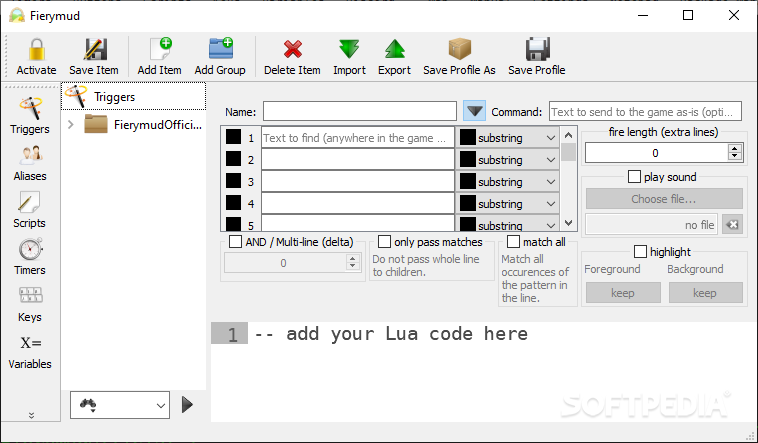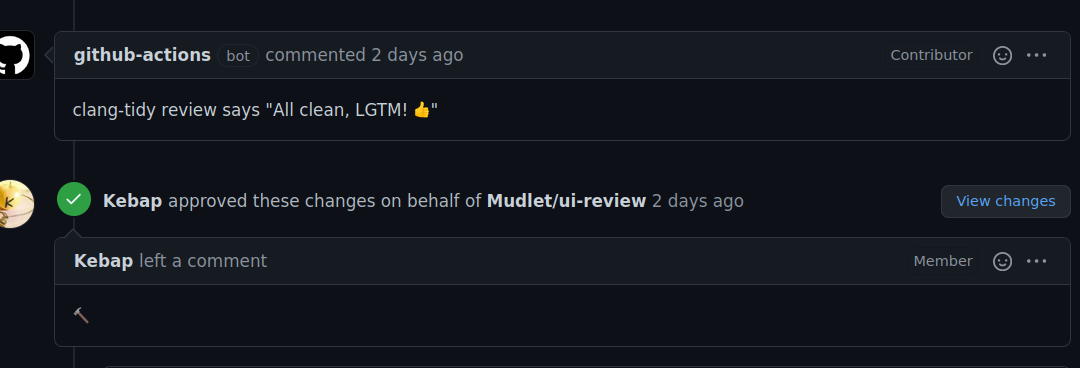

To keep your original ANSI colors, use ansi2decho(). You can also style foreground and background seperately with fg() and bg(). You can find lots of predefined colors with showColors(). While MUSHclient uses AnsiNote to write colorful text, Mudlet offers different ways as well: cecho() works with the name of a color.Send() in MUSHclient is called send() with a lower S in Mudlet - in Lua, capitalization matters! To send a command without echoing it on the screen, use:.

No variables in trigger patterns - but you can check against your variables in scripts, or lua function pattern types.

"%1" or %1 would be matches, "%2" or %2 would be matches and so on
 Mudlet doesn't use %#'s - uses matches instead. Mudlet has a ton more features such as more speed, less bugs, copy from the normal window, replay logging, color html logging, more powerful scripting, and the list goes on. Mudlet can do nexus graphics, here is a package for - Achaea, Lusternia. Mudlet and Nexus xml formats aren’t compatible. Mudlet does profile snapshots (nexus archives) automatically - to load a different one, select it from the list when connecting. To finish off, a couple of points that should be remembered: To make a function, you go to the Scripts section, create a new script, and write in your function:įunction can_i_stand () if not paralyzed and not prone and not stunned then return true else return false end if can_i_stand () and have_balance and have_equilibrium then send ( "stand" ) end Notes to be aware of This has many advantages - it’s faster, you can easily give your function values, and your function can return you values, too. What you do instead if create a function (for example, send() and echo() are functions) that you can then call from your alias or trigger. Now, while in Mudlet you can call another alias with the expandAlias() function, this is strongly discouraged. While the first use is good, the second isn’t - because the user can also run this alias at an inopportune time, because if you want to call an alias it has to match all alises again, and so on. The typical workflow in Nexus is that you’d define the aliases for yourself to use, and also use aliases for system-related things (things like checking if you’d need to eat a herb, etc). SelectString (line, 1) bg("") resetFormat() Note that this is a direct Nexus→Mudlet comparison certain functions in Mudlet have much more capability.ĮnableAlias("")/enableTrigger()/enableKey()/enableTimer()ĭisableAlias("")disableTrigger()disableKey()disableTimer() Now that we got the ifs covered, lets go over the Mudlet equivalents of other Nexus functions. following lines are all _one_ single if statement. blocks in its constituent clauses may have multiple lines. This shows how ifs continue (on 'logical' lines) even though the #echo These commands are all on separate lines too! Note: If you just have a pattern with a ' is Match the end of a line (not the actual newline character) Match one or more of anything EXCEPT 'a', 'b', or 'c' Match one or more of either 'a', 'b' or 'c'. Match one or more numeric digits (a number) Match one or more non-whitespace characters (a 'word') Make sure to set the pattern type in Mudlet to be perl regex, because the default substring works differently. For translating Nexus patterns into Mudlet, use the following table below.
Mudlet doesn't use %#'s - uses matches instead. Mudlet has a ton more features such as more speed, less bugs, copy from the normal window, replay logging, color html logging, more powerful scripting, and the list goes on. Mudlet can do nexus graphics, here is a package for - Achaea, Lusternia. Mudlet and Nexus xml formats aren’t compatible. Mudlet does profile snapshots (nexus archives) automatically - to load a different one, select it from the list when connecting. To finish off, a couple of points that should be remembered: To make a function, you go to the Scripts section, create a new script, and write in your function:įunction can_i_stand () if not paralyzed and not prone and not stunned then return true else return false end if can_i_stand () and have_balance and have_equilibrium then send ( "stand" ) end Notes to be aware of This has many advantages - it’s faster, you can easily give your function values, and your function can return you values, too. What you do instead if create a function (for example, send() and echo() are functions) that you can then call from your alias or trigger. Now, while in Mudlet you can call another alias with the expandAlias() function, this is strongly discouraged. While the first use is good, the second isn’t - because the user can also run this alias at an inopportune time, because if you want to call an alias it has to match all alises again, and so on. The typical workflow in Nexus is that you’d define the aliases for yourself to use, and also use aliases for system-related things (things like checking if you’d need to eat a herb, etc). SelectString (line, 1) bg("") resetFormat() Note that this is a direct Nexus→Mudlet comparison certain functions in Mudlet have much more capability.ĮnableAlias("")/enableTrigger()/enableKey()/enableTimer()ĭisableAlias("")disableTrigger()disableKey()disableTimer() Now that we got the ifs covered, lets go over the Mudlet equivalents of other Nexus functions. following lines are all _one_ single if statement. blocks in its constituent clauses may have multiple lines. This shows how ifs continue (on 'logical' lines) even though the #echo These commands are all on separate lines too! Note: If you just have a pattern with a ' is Match the end of a line (not the actual newline character) Match one or more of anything EXCEPT 'a', 'b', or 'c' Match one or more of either 'a', 'b' or 'c'. Match one or more numeric digits (a number) Match one or more non-whitespace characters (a 'word') Make sure to set the pattern type in Mudlet to be perl regex, because the default substring works differently. For translating Nexus patterns into Mudlet, use the following table below.








 0 kommentar(er)
0 kommentar(er)
